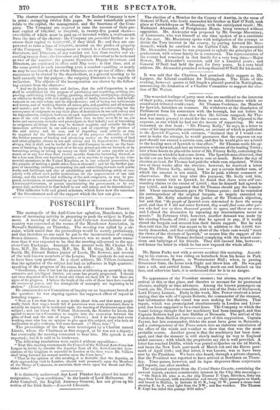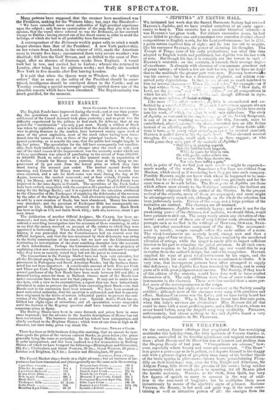No appearance of the President steamer; but alarms, reports of
its arrival at this or that place, and theories to account for its protracted absence, multiply as time advances. Among the known passengers on board, are Mr. Power the comedian, and a son of the Duke of Richmond, Lord Fitzroy Lennox. Early in the week, Mrs. Power received a letter stating that the wife of Captain Roberts, the commander of the steamer, had information that the vessel was seen making for Madeira. That report, which was promulgated simultaneously in London and Liver- pool, has been supposed to be a cruel hoax. The Company to which the vessel belongs thought that her machinery had been damaged, and that Captain Roberts had put into Halifax or Bermuda. The arrival of the Caledonia from Halifax disproves one part of this supposition. Captain Fayrer, her late commander, thinks she must have gone to Bermuda ; and a correspondent of the Times enters into an elaborate calculation of the effect of the winds and weather to show that that was the most probable course. Another guess is that the machinery has been dam- aged, and that the steamer is still slowly making its way to England under canvass ; with which the proprietors say she is well provided. A. letter has reached Dublin, which was posted at Quebec on the 2d March, and bears the New York post-mark of March 8th and the Havre post- mark of April 10th; and that letter, it was known, was to have been sent by the President. We have also heard, through a private channel,. that the President was reported to have arrived at Bordeaux on Thurs- day. Time passes, however, and its lapse disproves these conjectures and reports, one after another. The subjoined extract from the United States Gazette, containing tht newest report, excited considerable interest in the City this morning- " On March 20, nine a. as., the ship Thomas P. Cope, Miercken, forty-sir days from Liverpool, with merchandise and twenty-three passengers on board,, and bound to Halifax in latitude 42 35 N., long. 59 W., passed a steam-boat steering E. by S., wind light from the NW., and fine weather. The Thomas, P. Cope has sailed this passage 5050 miles." 11/fany perions have supposed that the steamer here mentioned was the President, making for the Western Isles ; bat, says the Standard- ,' We have consulted some naval authorities- of high practical experience upon the subject ; and, from an examination of the map, they give it as their opinion, that the vessel above referred to was the Britannia, on her outward voyage to Halifax ; having steered out of her direct course in order to avoid the icebergs, of which she had in all probability been forewarned."
A correspondent of the Britannia weekly paper calls to mind a much longer absence than that of the President. A new York packet-Ship, on her return from London, in the winter of 1835, made the American coast in twenty-five days ; encountered there very severe weather ; was disabled ; fell into the Gulf Stream, and so drifted to the coast of Por- tugal, after an absence of fourteen weeks from England. A vessel took her in tow, and carried her to Lisbon ; whence she returned to London, after being lost for eighteen weeks ; and finally she reached New Yolk in five months after first leaving London.
It is said that when the Queen went to Windsor, she left "strict orders" that as soon as the safety of the President should be ascer- tained, intelligence should be conveyed direct to the Castle ; and on Tuesday evening a special messenger actually carried down one of the plausible reports which have been circulated. The Royal curiosity was much gratified, for the moment.



























 Previous page
Previous page